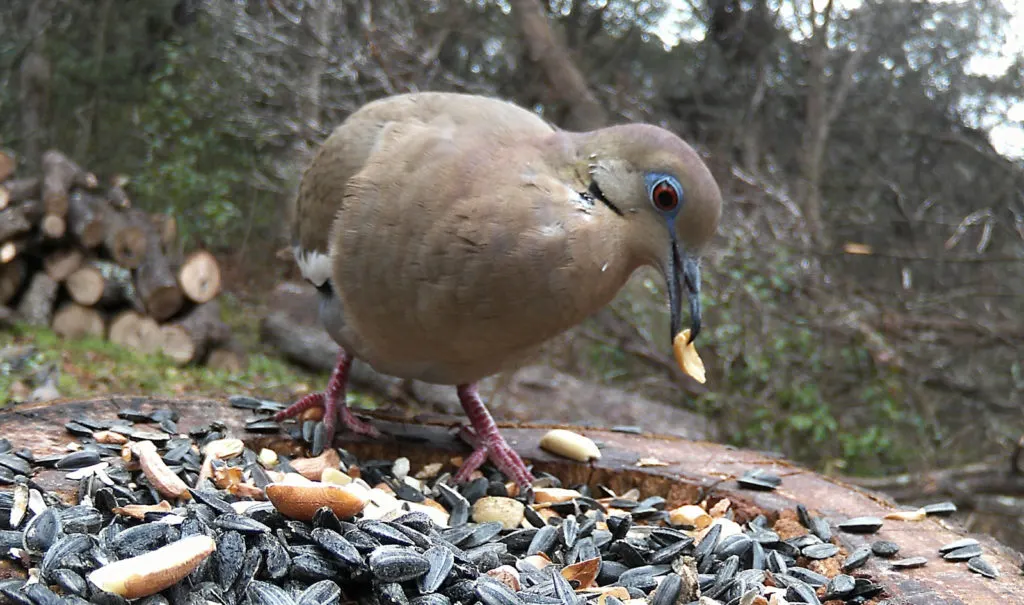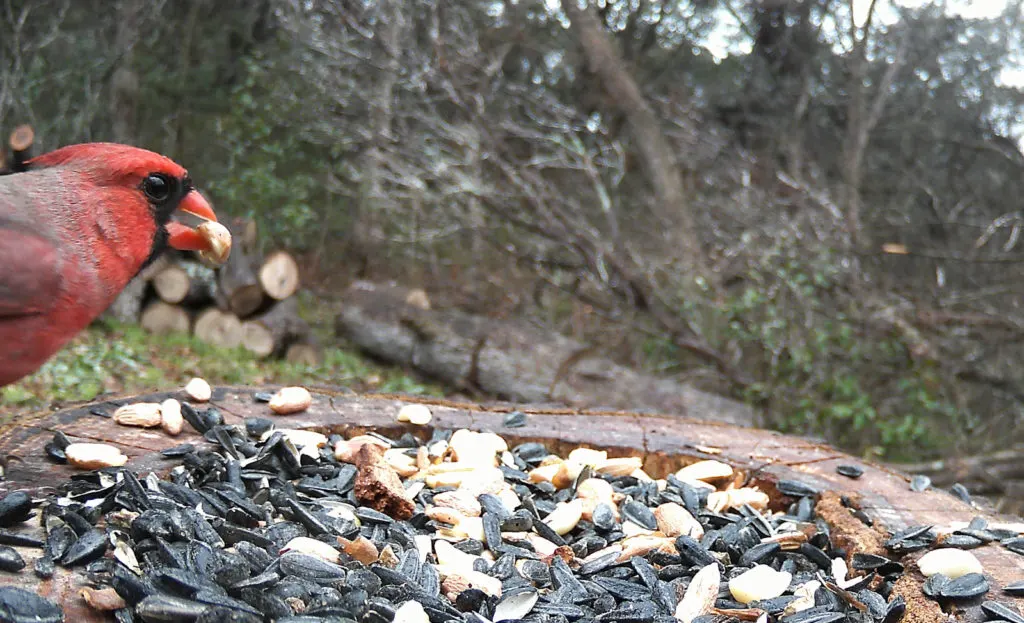Peanuts aren’t just a favorite snack for humans but also a highly nutritious option for various bird species. Offering peanuts at your bird feeder can attract an array of birds to your garden–but there are a few precautions to take.

Which Birds Like Whole Peanuts in the Shell?
Offering whole peanuts in the shell can attract a variety of birds to your yard, thanks to the high-energy content and the engaging challenge they provide. Here are some of the bird species that are particularly fond of whole peanuts in the shell:
- Blue Jays: Blue Jays are among the most enthusiastic about whole peanuts. Their strong beaks easily handle the shells, and they’re known to cache peanuts for later consumption.
- Crows and Ravens: These intelligent birds can manage whole peanuts without trouble, often using their cleverness to crack them open.
- Woodpeckers: Larger woodpeckers, like the Pileated Woodpecker, can handle whole peanuts and may visit your feeder for this treat.
- Jays (Other than Blue Jays): Steller’s Jays and Scrub Jays also enjoy peanuts and will readily visit feeders offering them in the shell.
- Northern Cardinals: Cardinals, with their strong beaks, can sometimes crack open peanut shells, although they may struggle more than Jays or Woodpeckers.
- Grackles: Grackles have the strength to open peanut shells and may be attracted to feeders offering them.
To ensure that the birds can access the peanuts but minimize spillage and waste, use feeders specifically designed for whole peanuts. Platform feeders or mesh feeders that allow birds to pull the peanuts through are ideal options.
Birds That Love Shelled Peanuts

Shelled peanuts, with their shells removed, are a versatile and highly nutritious food that can attract a wide variety of birds to your backyard feeders. Without the barrier of the shell, even smaller birds can enjoy the high-fat and protein content of peanuts. Here’s a list of birds that are particularly fond of shelled peanuts:
- Titmice: Small yet bold, titmice are adept at grabbing shelled peanuts from feeders.
- Chickadees: Chickadees love to snatch shelled peanuts, often taking them away to cache for later.
- Woodpeckers: Downy, Hairy, and Red-bellied Woodpeckers appreciate the easy access to the nutritious fats in peanuts.
- Nuthatches: Both White-breasted and Red-breasted Nuthatches are fans of shelled peanuts, skillfully handling them with their strong beaks.
- Jays: Blue Jays, along with Steller’s and Scrub Jays, are known to frequent feeders offering shelled peanuts, easily carrying them off.
- Cardinals: Northern Cardinals enjoy the easier-to-eat shelled peanuts, which provide a substantial energy boost.
- Wrens: Though smaller, wrens will occasionally venture to grab a piece of peanut if the size is manageable.
- Doves: Our doves love shelled peanuts!
- Carolina Wrens: Specifically, these curious birds might be attracted to feeders with shelled peanuts, especially in areas where they feel secure.
- Sparrows and Finches: These smaller birds, including House Sparrows and House Finches, might pick at smaller pieces of shelled peanuts.
Best Ways to Serve Shelled Peanuts
- Mesh or Wire Feeders: These allow birds to easily access the peanuts without the risk of larger pieces causing choking.
- Platform Feeders: Good for birds that prefer a more open feeding space but might attract a wider range of animals, including squirrels.
- Scatter Feeding: Simply scattering peanuts on the ground can attract ground-feeding birds, but use this method sparingly to avoid attracting rodents.
Birds that Like Peanut Pieces
Peanut pieces are an excellent choice for attracting a variety of birds not typically drawn to whole or shelled peanuts due to their size or the effort required to consume them. By providing peanut pieces, you cater to smaller birds or those with finer feeding preferences including:
- American Robins: While robins typically forage for insects and fruits, they can be attracted to peanut pieces, especially during colder months when other food sources are scarce.
- Eastern Bluebirds: Bluebirds, known for their love of insects and fruit, may also partake in peanut pieces offered at feeders, providing a high-energy supplement to their diet.
- Warblers: Various warbler species, often elusive and challenging to attract to feeders, might be tempted by the easy-to-eat peanut pieces, especially in migration periods when they require extra energy.
- Pine Siskins: These finches have a varied diet and can be attracted to feeders offering peanut pieces, appreciating the easy-to-consume size.
- Indigo Buntings: Beautiful and vibrant, Indigo Buntings may visit feeders more frequently when peanut pieces are available, adding a splash of color to your birdwatching experiences.
- Thrushes: Including species like the Wood Thrush, these birds might be attracted to the ground or low feeders offering peanut pieces, especially in wooded or garden settings.
Consider mixing peanut pieces with other types of bird food, such as suet bits or small seeds, to attract a wider variety of birds and provide a balanced diet.
FAQ
Can Birds Eat Roasted Peanuts?
Always choose raw, unsalted peanuts for birds. Roasted peanuts without salt are generally safe, but raw peanuts are more natural and nutritious.
Can Birds Eat Salted Peanuts?
Salted or flavored peanuts can be harmful to birds, as their bodies cannot process large amounts of salt.
Do Birds Eat Peanut Shells?
Birds generally do not eat peanut shells. The shells themselves don’t offer nutritional value, and birds are more interested in the calorie-rich seeds inside. While they might peck at or carry away the shells in the process of getting to the seeds, they’re not actually consuming the shells as part of their diet.
Can Birds Eat Boiled Peanuts?
Boiled peanuts, a popular snack in some regions, are not ideal for birds. The boiling process often involves adding salt or spices, which can be harmful to birds. Birds’ digestive systems are not designed to handle high levels of salt, and consuming salty foods can lead to dehydration, kidney damage, or even death in birds.
More Posts You Might Like
7 Bird Feeding Myths Debunked: Separating Fact from Fiction
- 8 Letter Bird Names - August 14, 2024
- 7 Letter Bird Names - August 14, 2024
- 7 Birds Named After Famous People - July 23, 2024
